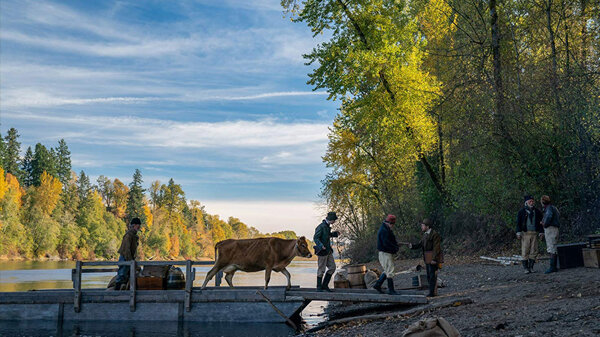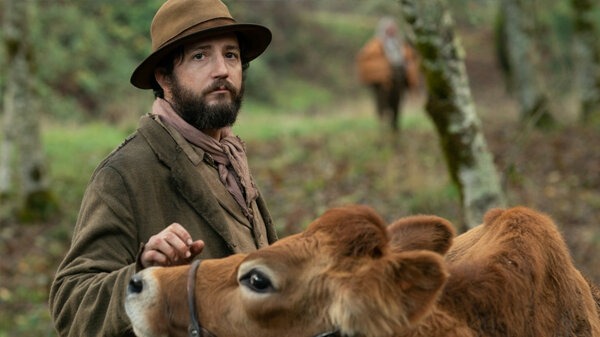Kelly Reichardt’s golden love letter to nature and those who live in it is finally out in UK cinemas – and so the film’s message is more prescient than ever before. Reflecting on food, friendship, and the kindness that binds us together, Brianna Zigler writes on the singular wonder of First Cow.
“The bird a nest, the spider a web, man friendship.” The William Blake quote unfolds across the screen, a prelude to a young woman and her dog unearthing the remains of two humans who seemingly perished together many moons ago. Their skeletons now lay side by side in the unforgiving northwest wilderness. We cut to a ragged man foraging for little orange mushrooms under the thick, benevolent shroud of trees and earth. He pauses his peaceful hunt for just a moment, to help a lizard lying motionless on its back. When propped upright, the lizard scurries away.
Kelly Reichardt’s First Cow is poetry in motion – based on screenwriter Jonathan Raymond’s 2004 novel The Half-Life, the film is a simplistic yet sumptuous anecdote of man helping nature and one another, set against the backdrop of Oregon Territory in 1820s America. As history unfolds and fresh steps are taken on a “new world,” a tale of kindness and comradery runs parallel, and men from around the globe find themselves fighting for their right to survive in a lawless land. The story is old, but the message remains evergreen: the importance of caring for one another in the face of adversity.
But part of the link holding these men together is forged from a simple, human need. The paradox of the land of abundance is in the scarcity of food. We’re introduced to Cookie Figowitz as a maligned cook in a party of trappers, having proven himself mostly useless at hunting and gathering in the eyes of the hungry men he attempts to serve. The many mushrooms he gathers remain unimpressive to these aggressive, fur-flanked travelers. When the moment strikes, Cookie finally breaks away from his pack and, by chance, befriends a traveling Chinese man named King Lu – on the run from a group of vengeful Russians, one of whom he murdered as payback for killing his friend. In their first encounter, Lu asks Cookie if his cook has retired for the night, and Cookie brings him something to eat. The unlikely duo eventually finds themselves in a ramshackle town, strung together by alcohol, exasperation, and anger. A man leaves his baby unattended for a bar fight. Cookie, a stranger, tends to the baby in his stead.
It’s a land of outsiders spanning the globe, all of whom have come with the same purpose: find fortune and success in this new world. Cookie and Lu remark to one another that the only way to do this is by acquiring wealth – something very hard to come by, a sentiment which remains greatly unchanged as centuries have come and gone. Even harder a task when a hierarchy exists between the types of immigrants laying foundation; at the top the British bourgeoisie, and at the bottom, well, everyone else, indigenous tribes forced into the same class divide as the people who don’t even belong there. So, the friends find their fortune by taking the road well-traveled: a life of crime. At the same time as Cookie and Lu have touched down in the shantytown, the first cow to come to this part of America does too. An exoticized monument to all who hear of it, the cow belongs to a man known as the chief factor, a wealthy Englishman who owns property nearby. The two miscreants thus hatch a plan to steal the cow’s precious milk by night and use it to make mouth-watering biscuits by day, selling them in the town to great fanfare.
Survival during this time cannot be achieved without alliances. But as proven through Cookie’s relationship with his former trapping party, and through his first encounter in the local tavern: men are all too quick, almost eager, to turn on one another. How can true fellowship be achieved when the one thing on minds of most is a primal, fight-or-flight instinct – their own self-preservation as their first priority? Being gentle to one another seems like not only a radical act, but an unnecessary one to other men, but Cookie and Lu are immediately softened to one another because of their mutual desire to live. Common ground brings the two men from single-minded survival to cooperation, to a genuine, deep-running bond.
Indeed, being gentle is radical act in the world of First Cow. In this old, foreign world, rough, calloused men are either allies, enemies, or strangers. They apprehend one another with suspicion or hostility. To extend any amount of tenderness in this era feels alien, but our need for one another is as primal a desire as any other. From their very first encounter, Cookie and Lu developed their friendship from a desire to eat. From there, food brought them both fortune, and common ground with other men. When the men of the town gather at Cookie and Lu’s feet to pay whatever necessary for a bite of one coveted “oily cake,” they come together as one, stepping on the same soil. By feeding the hungry men, Cookie and Lu are brought wealth and a stronger bond shared through their mutual resilience and cunning.
Kindness and altruism becomes essential to the survival of all these men. King Lu already showed Cookie what he would sacrifice for his friends, and Cookie, instead of abandoning Lu out of self-preservation in his quest to escape the abusive trappers, extends his hand to him, as he extended it to the struggling lizard. Later, when Cookie and Lu are invited to the chief factor’s house to prepare a blueberry clafoutis as he hosts a military general and an important Chinook man, the chief factor remarks to the general on the current fashion trends in Paris – beaver pelts are out, “colors du jour” are in. It exemplifies the ways in which human necessities (clothing) can still be used to establish a class divide, separating people into factions. It’s made all the funnier when the Chinook man (translated to the room by a Chinook woman) remarks tongue-in-cheek how white men neglect the greatest asset of the beaver; its tail, best for eating.
Of course, kindness cannot exist pure within the confines of capitalism – the very foundation of the American frontier, but the American dream shouldn’t be seen as a singular path to carve out, more an opportunity to share successes and forge mutual understanding. In an interview, Kelly Reichardt speaks on the necessary ambition to achieve the American dream, and how it doesn’t come simply by acting alone. “There’s a need for connectedness,” Reichardt says. “There’s a swayed justice system. There are so many made-up roadblocks for people.” King Lu and Cookie’s coming-together marks a united front that can quicker carry them to success, as noted by Reichardt, both in spite of and because of their differing backgrounds. “I feel like Cookie is not that ambitious of a person,” she reflects. “It’s weird that he’s a Jewish guy in the West, but he’s more discriminated against because he has a lack of wealth and toughness. King Lu has all this ambition, but he understands he needs to join up with a white-skinned person in order to achieve any of it.”
Still, humans retain a need for companionship even in – especially in – the harshest of conditions, when the very idea of sweetness could be deemed an extravagance, or, perhaps, a dangerous vulnerability. But as there is a closeness built between Cookie and King Lu, there is a sensory alignment to the film itself that you can’t help but feel while watching. Every texture, smell, and sizzle on a frying pan creates a tangible connection with the audience, a proximity achieved through our human senses.
But then there’s the crackle of leaves and the crumble of earth, the breath of the cow and the splatter of milk to pail as Cookie extracts her liquid gold. As exemplified by Cookie’s kindness towards small creatures, gentleness must extend beyond the barriers of what belongs to humans and what does not. We are as connected to the earth as we are connected to each other. Our flesh is made of the same matter as dirt, and one day it will return there.
And so it does – as Cookie and King Lu, hurt and hunted by the chief factor’s men, after their biscuit charade is exposed for what it really is, find themselves side by side on the cold ground. Cookie has suffered a blow to the head, both men exhausted and aching. They promise each other to merely take a short rest before they carry onward in their escape – but the rest never ends. Death and decay soon bind them to the forest, their skeletons as natural to the soil as the trees.
Brianna Zigler (@justbrizigs) is a freelance film writer based in the Philadelphia suburbs. She loves movies about sad boys and has words in Film School Rejects, Screen Queens, Vague Visages, Much Ado About Cinema, and more.
READ ME is a platform for female-led writing on film hosted by Girls on Tops. Louisa Maycock (@louisamaycock) is Commissioning Editor and Ella Kemp (@ella_kemp) is Contributing Editor.



